#phony emergency call
Explore tagged Tumblr posts
Photo

“"POLICEMAN'LL GET YOU",” Toronto Star. April 18, 1942. Page 3. ---- But He Didn't. Although He Went Unknowingly For Purpose --- Special to The Star Ingersoll, April 18 - When Constable John Holmes answered the telephone in police office last night, a muffled female voice urged a policeman to come at once to a north side address. The officer took a taxi to make time. When the door was opened in response to his knock, she exclaimed: "Oh. constable. I am so sorry.. I did not. think you could hear me. I was just trying to scare the children to make them behave."
#ingersoll#police officer#phony emergency call#phony call#scaring the kids#disciplining children#emergency alarm#canada during world war 2#crime and punishment in canada#history of crime and punishment in canada
0 notes
Text
Ross Rosenfeld at New Republic:
As the old saying goes, there are three types of lies: lies, damned lies, and statistics. Elon Musk has demonstrated mastery of all three, often simultaneously. Musk’s so-called Department of Government Efficiency has made wild claims about the savings it has supposedly accrued during its blunt force takeover of government institutions, including the Office of Personnel Management, where Musk’s minions—some just recent high school grads—are wreaking havoc.
Before Trump took office, Musk promised to find $2 trillion in savings each year, despite the fact that discretionary spending totals only around $1.8 trillion. So far, no such savings—or anything close—has materialized, and no evidence of the massive waste and fraud Musk vowed to uncover has emerged. Instead, Musk and the Trump administration keep throwing out random figures that are misleading at best, and often downright lies. Their goal is not merely to apply a veneer of truth and legitimacy to their wholesale wreckage of the federal government, or to make it even more difficult for the fact-checking media to keep up with the Trump administration’s relentless, dizzying moves. It’s also a sleight of hand to make it appear as if it’s not corporate titans like Musk himself who are receiving sweetheart deals and robbing the American people blind, but “deep state” bureaucrats, DEI recipients, and African children. Though Musk alleges that the government is rife with incompetence, he and his DOGE team appear most incompetent of all, having created a website that was easily hacked last week. But that pales in comparison with the dubious statistics published on the site and spouted elsewhere by the administration. Some examples: DOGE posted claims of $16 billion in savings on Monday, half of which it said came from the elimination of a single contract for a diversity program at ICE. They were only off by a factor of over 1400, since the real savings from the canceled contract was no more than $5.5 million. As The New York Times pointed out, the contract they cited was actually for $8 million, not $8 billion—and $2.5 million of it has already been spent, and thus is unrecoverable. Even after the mistake was pointed out, DOGE continued to assert the $8 billion figure. The Times also noted, “A larger total savings number published on the site, $55 billion, lacked specific documentation.”
Not only was that $8 billion complete bunk; turns out, so were the next three highest “savings” claimed on the site. DOGE professed to find another $1.9 billion in savings from terminating three contracts for USAID, each for $655 million. But these contracts were what are known as Indefinite Delivery Vehicles, or IDVs. Such contracts allow the government to set spending limits but do not require it to meet those limits, meaning that it can cancel the contract at will. So far, the government had spent only $55 million of that $1.9 billion. It’s worth noting that spending on USAID—which Musk called “a criminal organization” and the Trump administration has unilaterally (and possibly illegally) shut down—is not wasted money, but brings tangible benefits, including providing HIV treatments in Africa, countering Russian propaganda, and aiding civilians devastated by war in Syria and Ukraine. It’s our best tool for soft power, burnishing America’s image around the world by providing material help where it’s need most. And despite Donald Trump’s claim that “billions of dollars have been stolen” by the organization, former USAID Administrator Andrew Natsios told 60 Minutes that it is “the most accountable aid agency in the world,” with 40 percent of the staff, he estimated, made up of lawyers and accountants tasked with watching every dollar. The administration has also made the suspect claim that millions of dead people are receiving Social Security benefits. Musk said it “might be the biggest fraud in history” even shared a graph on X purporting to show this, apparently believing that everyone at the Social Security Administration was so stupid as to not recognize that the agency was sending out more than 5 million checks to people past the age of 140. Yet the only fool in the equation was Musk. Neither he nor Trump, who repeated the claim, appear to understand that while there are millions of people still in the Social Security database because their deaths were never recorded, these people do not receive checks. A total of 89,000 people 99 years old and over receive checks, which, unsurprisingly, aligns remarkably well with the U.S. Census estimate that there are 85,000 people 100 and over in the country. Simply checking a list of Social Security check recipients would have cleared up the entire issue. Yet Musk was either too dumb or too lazy to do so. Or, perhaps more likely, he just didn’t care if it was true or not because it served his purposes.
The stats that Trump and Musk are spouting in order to justify draconian cuts are bogus.
85 notes
·
View notes
Text
[In the living room, Tails is typing on the laptop] Tails: Sonic! I found the transmission. Amy: How exciting. Broadcasting the ARK’s research is a big step and shows how much they've changed. Tails: Wherever Tori goes, good follows. It's starting! [Everyone takes a seat on the couch to watch the transmission. On screen are Tori with Abraham, and Shadow at his side] Knuckles: No subtitles? Tails: I can turn the volume up if you want. Knuckles: No, I don’t get a word of it. Amy: They’re saying they’re starting a research to cure diseases and improve quality of life in old age. [Everyone stares at her] Amy: What? Shadow and I talk about all sorts of things. Sonic: What’s that glitching in the corner?? Tails: No, no, no! Who touched my laptop?! Amy: Calm down. It could be the transmission. They're basically orbiting next to the moon. Knuckles: It’s getting bigger… I feel like I’ve seen that before? [On the transmission, Tori is speaking and explaining the process they plan to follow. On her left side, where no one was before, a white head begins to emerge. Bit by bit, we see it's Sage, being lifted into the air by the armpits like Simba. Tori flinches slightly and stops mid-sentence.] Abraham: Ivo?? All four: Eggman? Shadow: We're screwed… Robotnik: Hello, viewers, have you seen my daughter? [hugs her, pressing their cheeks together] Amy: Oh my, look at Abraham’s vein! Knuckles: That’s some real HD. Tails: He’s gonna get his ass beat… Sonic: Can you imagine??? I’m going to tell everyone else to come watch! Hook this up to the TV! [dashes out] Tori: Sir, you again? I already told you I’m not going to promote your technology. Robotnik: But why. Think of it like a sponsorship. Abraham: And how much are you paying us?! Robotnik: With my global contribution: an AI created from scratch. Egg-Tech, if it doesn’t come with an egg on it, it’ll go rotten. [winks at the camera] Tori: If you want to advertise, use another platform. I won’t allow this here. Robotnik: With all due respect, miss, I think you’re a phony, then. Shadow and Abraham: Ivo! [In Sonic’s living room, now with the transmission on the TV and the whole group gathered] Everyone: He screwed up. Tori: What did you just call me?? Robotnik: A phony. From F to Y. You’ve been preaching about progress, and when I show you revolutionary technology that could help people right now, you turn it down because it’s not about smoke and mirrors. What, now my daughter’s worth less than some dying old man in some sleazy care facility? Amy [emphasizing]: Holy molly… Robotnik: Hypocrites. A tiny gesture from you people could change my life. Sage: Dad, please— Knuckles: Let him go on, let’s see if his face gets punched! Robotnik: You’re all about helping people you don’t even know, but then you can’t help the one standing next to you. Oh right, because this won’t get you money or a prize, will it, phony? Tori: Stop disrespecting me. Robotnik: You disrespected me first by insulting my daughter! Sage: I don’t feel insulted. I foresaw this poor outcome. Robotnik: Hush, I’m defending you. Tori: Sir, leave. You’re embarrassing even your daughter. Robotnik: Don’t drag my daughter into this, she has nothing to do with it! Tori: You literally brought her to show her off like some circus monkey! Robotnik [pointing at her]: They brought you here to be their little puppet and whitewash their image. I might be an asshole, but always upfront and proud! Sonic: He’s not wrong about that. Tori: Don’t point your finger at me. Robotnik: Oh, the phony’s scared of a little finger, huh? Not scared to work with a historically corrupt organization but terrified of my finger. Uuuuuh-- [Tori punches him square in the face and Robotnik drops to the floor as Sage, Shadow, and Abraham watch in stunned silence. Back at Sonic’s house, everyone is speechless too.] Tails: I’ve been saying for years this guy needs to be institutionalized. The moment I see him drool, we’re doing it.
Previous
Last
#incorrect quotes#sth#sonic the hedgehog#shadow the hedgehog#tails the fox#miles tails prower#sonadow#knuckles the echidna#amy rose#team heroes#vanilla the rabbit#cream the rabbit#team chaotix#team dark#abraham tower#commander tower#abe tower#professor victoria#professor tori#sage the ai#eggman#ivo robotnik#dr robotnik#dr eggman#blaze the cat#silver the hedgehog
38 notes
·
View notes
Text
GAL HISTORY
ₓ˚. ୭ ˚○◦˚.˚◦○˚ ୧ .˚ₓ
The Peak of the Kogyaru: 1993-1998
At the end of our last installment, the gyaru movement had spontaneously erupted in Shibuya — but in small numbers. These delinquent private high-school girls with light brown hair, tanned skin, and sexualized uniforms became known as kogyaru in certain circles, but they were still unknown to most of their peers.
Since the days of the Taiyo-zoku and Roppongi-zoku of the 1950s, upper-class delinquent subcultures have spread their influence to the middle classes through the mass media. And in most of these cases, the media first reports on the new culture as a moral panic.
From fantasy to moral panic
Japan’s quite expansive selection of shūkanshi weekly men’s magazines, such as SPA!, Weekly Playboy, and Friday, dedicate dozens of pages each week on celebrity gossip, glossy bikini and topless photos, reviews of sex services, and phony stories of naughty housewives. They do not, generally, take much interest in the latest fashion trends for young women.
Yet ironically it was these very magazines that first noticed the kogyaru phenomenon and arguably standardized the subculture’s name as “kogyaru.” Sociologist Namba Koji found what may be the earliest direct mention of the subculture in SPA! from June 1993 in an article called “The Temptation of Kogyaru”「コギャルの誘惑」. The article’s writer breathlessly tells his readers about the kogyaru clan and how they have become his new sexual infatuation.
The kogyaru emerged just as Japanese men grew bored with the 1980s’ obsession over female college students — the so-called “joshi daisei” boom. Beyond the kogyaru, men’s media were already lowering their gaze to secondary education.
The March 24, 1993 issue of Takarajima, for example, ran an article about the purchasing of sexual favors from high school girls, complete with a price guide (Namba 2006). The overall message to male readers was that the new generation of teenage girls had — very conveniently — embraced consumerism and materialism so fully that they no longer felt qualms about selling their own bodies.
This was also an era when a new suite of communication technologies provided greater independence to young women — playing right into many of the men’s magazine fantasies. Tokyo high school girls in the early 1990s, especially those in kogyaru circles, started carrying around primitive pagers called pokeberu (“pocket bell”) to send numerical messages to friends.
By the mid-1990s, these threads crystallized into the greatest moral panic of the entire decade — enjo kōsai. The term, meaning technically “compensated companionship,” became a widely-used euphemism for teenage prostitution and a buzz word of the era. Former egg editor Yonehara Yasumasa claims that enjo kōsai began as a mischievous but relatively innocent way of playing pranks on middle-aged men.
This unfortunately became a self-fulfilling prophecy: The more the media reported on the shocking phenomenon, the more that the small percentage of girls who were looking to sell themselves ended up flocking to the streets of Shibuya and finding buyers. There is no doubt that many schoolgirls did prostitute themselves in this era, but it remains unclear today how widespread the phenomenon was.
Nevertheless enjo kōsai became the defining issue of the era. Academic David Leheny later wrote“There is a case to be made that the kogal image epitomized Japan’s hazily defined crisis of the 1990s at least as well as did layoffs by top Japanese firms.” Conservative moralists used the trend as evidence that society had become overly materialistic and that society was decaying rapidly.
So by the mid-1990s, Japanese male sexual culture became obsessed with high school girls, the mass media became obsessed with schoolgirl immorality, and right in the middle of this, a brand new sexually-styled delinquent subculture had shown up in Shibuya.
Yet it is becoming clearer now that despite twenty years of stereotypes, the kogyaru were not the core practitioners of enjo kōsai. Famed sexual health doctor Akaeda Tsuneo, who has spent his years giving free consultations to teen girls in Tokyo, explained to Takarajima in February 2008 that “The girls called gyaru had too much pride and weren’t the ones doing enjo kōsai” (Kurihara).
The gyaru’s style, attitude, and Louis Vuitton bags, however, made them fit the stereotype, and they faced both the wrath of moral authorities as well as the constant advances of older men in the streets. A former kogyaru interviewed on website Tokyo Damage Report noted that “You’d get old guys who would say, ‘How much for sex?’ Some would hint, some would just start negotiating without any pre-amble.
This battle against the media and adults ended up changing the gyaru subculture in many ways. The aforementioned Yonehara Yasumasa believes that the kogyaru’s constant harassment from older men is what led to the development of their famously gruff and masculine speech. They turned inward — sexy to their own group, but angry and intimidating to outsiders. And as we will see in the next installment, this move away from open sexuality focused the gyaru on impressing fellow subculture members with extreme dress rather than wearing “cute” things to attract boys.
While the enjo kōsai controversy certainly tarred the gyaru subculture for years to come, at least by the mid-1990s, every single person in Japan had heard of it.
Kogyaru as fashion market
While the country debated the morality of schoolgirls, the schoolgirls themselves were busy shuffling into Shibuya and taking up influence from the kogyaru’s approach to dress. The Shibuya style may have been simple to replicate — chapatsu light brown hair, slight tan, hiked up school girl uniform, loose socks — but the original subculture also depended upon a certain social position and attitude. Since the kogyaru descended from an actual group of people and not the direction of the fashion industry, they were not instantly imitable.
So how would a new kogyaru recruit figure out how to properly dress in the style? When the kogyaru reached mass consciousness in the mid-1990s, there were still no dedicated “gyaru” magazines that worked with “gyaru” brands to show a step-by-step guide on becoming a “gyaru.”
There was, however, a shopping complex with increasing centrality to the subculture. In the early 1990s, both kogyaru and their older paragyaru-type tanned party-girl big sisters had patronized a store called Me Jane in a generally-ignored fashion building called Shibuya 109. Known later in gyaru circles as just “maru-kyu,” Shibuya 109 opened in 1979 but never achieved any level of popularity in its first decade. Fashion business analyst Kawashima Yoko described its early days as “Like Marui, but worse.” With Me Jane, however, the building finally started to attract a dedicated clientele. Soon kogyaru moved beyond Me Jane and started hanging out next door in a clothing store Love Boat and in the shoe brand ESPERANZA (Kawashima 178). The brands all focused on a sexy, summery style, with shirts, for example, that showed off the belly button.
Shibuya 109’s owner Tokyu noticed this sudden interest in their flailing complex and decided to do a “renewal” of the building in the mid-1990s, asking more stores of the kogyaru fashion variety to become tenants. This turned 109 into the gyaru shopping mecca we know today. As kogyaru wannabees poured into Shibuya, they made a beeline to 109 and essentially understood any store in the building as selling “gyaru” clothing. In this period, Me Jane saw double digit growth every year, ultimately making ¥700 million a year in Shibuya alone (Namba 2006).
Besides the financial success, the establishment of 109 as a legitimate location for kogyaru style meant that the brands inside were now pumping out thousands of new garments that could be used to build a “kogyaru” outfit. No longer did girls need the uniform — they could wear mid-riffs from Me Jane and ESPERANZA platform sandals. Hardcore adherents wore “flare mini-skirts from surfer brand Alba Rosa, bustiers, blue mascara and pink rouge” along with the standard chapatsu and salon tan (Okamoto quoted in Namba 2006). In expanding the look, the kogyaru unwittingly opened up their growing subculture to girls who were not in the proper Tokyo social status to participate before. Anyone who shopped at Shibuya 109 could now potentially become a kogyaru, making the style open to non-Tokyo girls and the middle classes.
Even now Shibuya 109 is the main fashion instigator for gyaru style. One of the reasons for the complex’s enduring success has been the brands’ innovation in retailing methods, namely creating strong relations between customer and shop clerk. In the late-1990s, many of the original kogyaru started to get jobs at 109 shops, and they became authoritative figures of the movement. Referred to as “super charisma clerks” (スーパーカリスマ店員), these 20-something workers took their responsibilities far beyond mere in-store transactions and acted as spokespeople in the media for their brands.
So while Shibuya 109 marked the mediation and commercialization of the once organic kogyaru style, the retail structure helped keep the actual girls in control of setting trends — rather than big brands and magazine editors.
GAL WAS NEVER MEANT TO BECOME CLEAN OR WATERDOWN!!!!!

#heisei gyaru#gyaru fashion#gyarustyle#gyaru aesthetic#gyaru#av gyaru#gyaru blog#gyaru gal#gyaru makeup#gyaruo#gyaru history#hime gyaru#gyarusa#gaijin gyaru#餃子の王将#ギャル達 ギャル#ギャルファッション#ギャルメイク#ギャル男#行销策略#餃子#くろねこ
22 notes
·
View notes
Text
“Robin Hood!?” The utterance of that name broke the silence in the royal treasury like a rusty nail in a bucket of ice. “Ahaha! I’ll get even! I’ll…get…mmmm…” The silence returned as quickly as it had vanished. The voice became muffled, its owner smiling, his tail and hind paws wriggling in sleep-filled contentment.
A discordant symphony of heavy snores and sleepy mumbles emanated from the occupant of the royal bed. Tossing and turning, Prince John grumbled, his drowsy mind replaying his prior conversation with Sir Hiss. “It’s Robin Hood I want…to…kill…” He rolled wearily onto his stomach. Presently, a soft giggle emerged from his mouth, building up into a hearty laugh.
A delightful dream filled the slumbering prince’s mind; he was now a little cub, playing with his father, whose paws were gently tickling his toes. “Here comes the tickle monster!” His father’s playful singsong voice cooed lovingly. Prince John continued to laugh at the delightful dream and the ticklish sensation that accompanied it, playfully kicking his father’s paws away and tucking his legs out of reach.
His paws slowly wiggling, with an incoherent, drunken melody emerging from his mouth, Prince John rolled onto his back, sinking into the warm silence of a dreamless sleep…
The sudden movement of being lifted forward and sharply dropped backwards startled the phoney king, causing him to flail and whine anxiously. As he so often did when he felt upset, Prince John began to tug his ear with one paw and suck his thumb with the other. The sensation sent a wave of peace washing over him, his fussy pout now replaced with a dreamy smile. Lying there, all curled up, with a single bag of gold slipped under the crook of his arm like a stuffed toy, one would never have suspected that this childlike creature was the same petulant tyrant who called himself the king of England.
Prince John whined in his sleep, his mouth desperately reaching for his thumb, which his slumbering mind believed to be the teat of the royal wet-nurse. It had somehow slipped out of his mouth as he slept, but as he searched for it, the drool-covered appendage popped back between his pursed lips. A contented smile stretched across the infantile monarch’s face as he sank back against the pillows, his mind drifting deeper into the sweet, warm, peaceful dream of being a newborn cub once again.
————————————————————
I literally just woke up and was so sleepy that I poetically rewrote my favourite scene from Robin Hood, entirely from PJ’s perspective. I still love the fact that this man straight up slept through almost the entirety of a gold heist taking place right under his nose!
@the-phony-king-of-england behold the eepy floof 😊
#Prince John#Robin Hood#disney robin hood#creative writing#sleepy#*pets PJ* the poor baby#he’s so cute
10 notes
·
View notes
Text

Scarlett Johansson has expressed alarm at the risks of artificial intelligence following a deepfake video that emerged, misleadingly showing her and other Jewish celebrities protesting against Kanye West. The acclaimed actress is calling on the U.S. government to make legislation controlling AI use a top priority to avoid such abuse. The doctored video, making the rounds around the web, includes Johansson as well as celebrities such as David Schwimmer, Jerry Seinfeld, Steven Spielberg, Adam Sandler, Sacha Baron Cohen, Natalie Portman, and Lenny Kravitz. They were depicted in white T-shirts carrying a Star of David on the hand that holds up one-finger salute across the word "Kanye." None of those celebrities appeared in the video, though, with their likenesses used without their permission. The controversy is in response to West's latest exodus from the X platform after posting antisemitic content. The rapper, who legally goes by Ye at the time, previously left fans aghast when they offered swastika-emblazoned T-shirts on his site. The phony clip, presented in a manner mimicking his explicit action, displays the caption: "Enough is enough. Stand against antisemitism." Gage Skidmore, CC BY-SA 3.0 https://creativecommons.org/licenses/by-sa/3.0, via Wikimedia Commons She responded with a statement in People magazine, highlighting her opposition to hate speech but also voicing strong concerns regarding the implications of AI-generated content. "It has been brought to my attention by friends and family members, that a video created using AI, in my likeness, in response to an antisemitic opinion, has been shared online and was gaining popularity," she said. "I am a Jewish woman who has no patience for antisemitism or hate speech of any form. But I also strongly believe that the possibility of hate speech amplified by AI is a much bigger danger than any single individual who takes responsibility for it." Her statement highlights the broader issue of AI’s capacity to distort reality, making it difficult to distinguish between truth and fabrication. She warned that if the misuse of AI remains unchecked, society risks losing its grip on what is real. The timing of this deepfake video aligns with heightened tensions surrounding Kanye West. Recently, he further incensed by calling himself a "Nazi" and showing admiration towards Hitler on X. After getting slammed, West announced that he was closing down his account. Fueling more outrage, he hosted a Super Bowl ad where viewers were prompted to visit his website, selling only swastika-print T-shirts. Nonetheless, Shopify removed the site over policy infractions. Fox Television Stations CEO Jack Abernethy also weighed in on the issue in a memo to employees, denouncing the dishonesty of the ad. "The ad, which was promoted as a legitimate online clothing website prior to and during the Super Bowl broadcast, was swapped out at some point thereafter, and entirely outside of our stations' control, viewers of the commercials were rerouted to the promotion of an entirely despicable product," he stated, reported Variety. In the meantime, rapper Ty Dolla $ign, who teamed up with West on his 2024 albums "Vultures 1" and "Vultures 2," has stayed clear of the scandal. Though he did not explicitly denounce West, he took a position on social media. "I do not support any type of hate speech against anyone," he wrote on Instagram. The deepfake video of West was produced by Guy Bar and Ori Bejerano, online marketers for the Israel-based creative agency Gitam BBDO. Posting the video on Instagram, Bejerano described the inspiration for the project. "It's time to stop being silent and respond to antisemites like Kanye West in the strongest way possible," he wrote. The virality of the video has also attracted conflicting responses. While some fans initially thought that the celebrities had criticized West, journalist Nicole Lampert observed in the Jewish Chronicle that the campaign highlighted the inactivity of well-known figures on the issue. "It was exciting to watch Jewish celebrities call out Kanye West - if only they actually did," she said. "A viral video of the campaign, which turned out to be AI-generated, does nothing but amplify the deafening silence of the celebrity class." Outside of this particular instance, the problem resonates with a broader issue about AI-generated content and its deceptiveness. Fresh statistics from the UK's Advertising Standards Authority show that fake celebrity and public figure advertisements continue to be the most prevalent form of online fraud. With increasingly advanced AI tools, the danger of manipulated content spreading misinformation and ruining reputations increases exponentially. Johansson's call to action follows a larger trend calling for greater regulation of AI. As deepfake technology develops further, there are warnings that the capability to create realistic yet deceptive content will be increasingly accessible. Without appropriate control, people and institutions are increasingly likely to become victims of AI-generated disinformation, eroding trust in digital media and public debate. The actress's position reiterates the importance of preemption of such issues prior to further undermining the capacity for distinguishing reality from fiction through deepfake technology. While controversies surrounding AI regulation persist, Johansson's alarm call is a dire warning of artificial intelligence's ethical implications at a time when digital content is virtually indistinguishable from reality. Read the full article
2 notes
·
View notes
Text
Chapter 6: The Decay of Our Lives (#27c)
The computer screen has some dust clinging to it, but only enough to tell me it’s been on lately. The power button is dust-free.

“So has someone been coming in here this whole time, or just recently?”
Given the boards over the door, I’d assume the latter. Unless it only seemed like it was boarded up, somehow? At this point it’s hard to feel sure of anything.
The computer finishes booting and shifts to a home screen without so much as a password prompt. Guess there’s enough physical security that the young master didn’t see any need.
The wallpaper is some objectively ugly gradient involving red, and only default application icons break it up.

“There’s a web browser.”
Is it too late to call for help? Too early? I don’t want to jeopardize the whole mastermind trial by breaking some unspoken rule, but it’d just be stupid not to try. I double-click and hold my breath.

“.....”

“...’Not connected to the Internet’.”
I try troubleshooting, but the only available connection is locked. So here’s where I’d need a password, huh. Great.

“Guess I’ll just check the history, then.” On the Internet and otherwise.
Not a lot here, but most of it’s in the middle of the night. Makes sense. Repeated visits to something that sounds like a surveillance site of some kind. Nothing that helps me much, and it doesn’t look like the log goes any earlier than our stay here.
I move on to the local files. Pretty sparse—a few images, but they all seem to match up to what I found in the art room. Probably got printed off from here in the first place.

“Then we have some word processor files. Some haven’t been edited for a few months, looks like.”
Here before we were, then? Definitely worth a check.
I open up some kind of newsletter. The spots for accompanying photos are missing, but all the text is already drafted. But it’s dated... next week? The week after? One of those.
But it’s not like whoever wrote this was predicting what’s actually going on here. It’s just a bunch of normal school things that never happened, with quotes from teachers I’ve never seen and references to members of our class.

“So... What? They prepared these to send to our parents to pretend everything’s normal?”
I don’t know if the school usually did that, but it’d certainly take the edge off the emergency-only communication or whatever policy they have here. I can’t exactly believe what the phony orientation email told me.

Phony this, phony that, phony everything with just enough real thrown in to muddle it up. That’s the mastermind’s whole M.O., seems like.
Guess we’ll have to see how hard it is to tear down.
KOTODAMA GET
Newsletter Drafts: The headmaster’s office had drafts of ordinary school newsletters prepared since before the killing game began. They included the correct members of our class but none of the real events.
Orientation Emails: The students received electronic invitations to the academy with different times to arrive, and an unknown amount of bogus school information.
[BACK]
2 notes
·
View notes
Text


my phone sent a phony emergency call to my mom so now it looks like i was attacked by a giant pika
3 notes
·
View notes
Text
the summer i turned pretty 2x06 review -- no, i swear, tho, conrad was just sad...
Episode 6, the episode anons have wanted me to watch.
"I don't know I'm kind of happy here" after one day. THE MAGIC OF COUSINS.
"I know things are not great right now but it's always darkest before the dawn, right?" Why make him speak in cliches?
Cam Cameron WHY. ARE YOU HERE?
I like how Belly could've just said "We should throw a party" but because we're supposed to understand the closeness of these families through dialogue alone she has to say it in a roundabout way so she can talk about a memory of her mom and Susannah that Conrad and Jeremiah should already know if it's like they all grew up together 3 months out of the year.
This zen conversation with Steven and Conrad is legit like the first real conversation I've witnessed on this show.
This volleyball conversation is so forced.
"Your subconscious brain takes you there" You can just say subconscious, Jere. Who wrote this.
Oh look, ANOTHER taylor swift song. jesus christ.
I think I got a few requests to do a vid to this song and I remember just not getting over "is it chill that you're in my head?" because I thought it sounded like when you go to the thesaurus and look up synonyms for "cool".
They're both trickling their hands in the water, are their fingers going to touch and it's going to be ELECTRICITY?
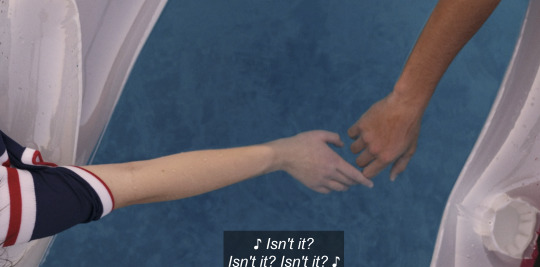
Yes.
But this is her I FEEL THE ELECTRICITY face

You know, we can't even consistently stay here

at marginal almost kind of chemistry
"I'll come too!" Taylor's "Uh huh" is the only time I've marginally liked her.
You can't scoff at him calling her his muse with your cliched valedictorian speech, Steven.
LOOK AT MY FAKE I.D. k.
"Wooooooow, your I.D. didn't work Mr. Herbertson??" "Fuck off, at least I have one" oh my god, a moment between them that ACTUALLY sounded genuine. I am amazed. It will most likely die of loneliness.
And Jumper laughing then pointing at the sign is legitimately the only funny moment I've seen throughout this entire season.
BELLY WILL SAVE THE DAY. SHE WILL GET THE BOOZE. BECAUSE SHE IS BELLY. AND IT IS THE SUMMER SHE TURNED PRETTY.
She doesn't even sound sincere.
i am laughing so hard, this is the first time i've read rap on this show and it's because SHE'S SO GANGSTER SHE GOT THE BOOZE BECAUSE SHE'S BELLY.
Conrad asserting his dominance after Belly got Jeremiah a drink but not him one by drinking from Belly's straw is actually pretty funny though. It would be better if Belly wasn't so ... herself.
I love that Skye and Cam Cameron are the ship I care about the most (and I'm using the word 'care' SO loosely).
"The sacred emergency Amex??" It went back to being phony.
I can't deal with more Taylor and Steven.
And she'll put the boa around him because this show loves cliches.
And Jeremiah will see because this show loves cliches.
"Belly, you don't have to apologize for that" she kind of does though. She was kind of completely terrible.
Girl, you can shrug and shake your head all you want, it doesn't compensate for a lack of emotion in your face or voice.
And he's blinking trying to find his well of emotion and that shit is dry, my friend.
It's not like he was kissing Aubrey, it's not even like they were hugging, he had his head in her lap and you can say "teenager" all you want but this is ridiculous.
This is also the closest they've come to executing what they want with these two and it's still not done well but when he says "Aubrey was just the one who found me I wish it was you" I can at least say I believe that.

There we go.
So I'm guessing she's supposed to have this cosmic, soulful, reach into each other's soul connection with Conrad and a fun, chemistry-filled familiarity with Jeremiah. I've just seen both things done properly so this is just very big shrug.
I was going to say something about the 'how to kiss' conversation but then I was like, lol there are too many youths on my blog. So, moving on.
"I always hated when Mom made us take these pictures but it's like she knew we'd want them later" yes, Jeremiah, that's the purpose of a picture. He would annoy me less if they stopped giving him asinine lines.
"Looking at you mooning over Conrad" "That was a LONG time ago" how long ago was this break up, Belly?

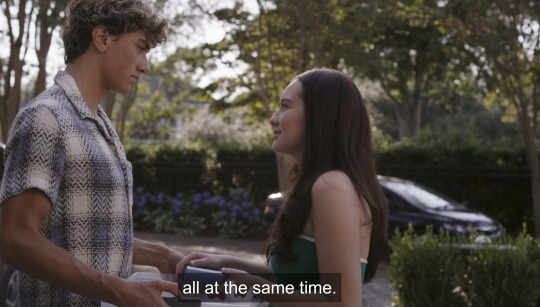
she's saying the same thing twice. That's just called moving on. What it should be is "mourning your past and moving on in the present" or "remembering your past and moving on in the present" or "celebrating your past and moving on in the present" or "appreciating your past and moving on in the present". WHO. WROTE. THIS.
So Jere is Dean and Conrad is Jess, which anon essentially told me. Except Conrad is nowhere near as bad as Jess. He is just a boy who's been sad. LMAO.

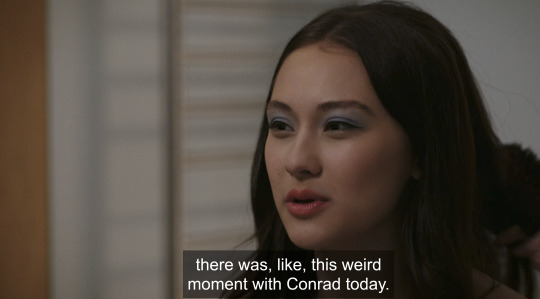
she needs to be stopped.
"I don't want to talk about Conrad, he really hurt you" BY BEING SAD?
"You don't need to hurt yourself to get my attention" that was almost hot but he lacks the conviction necessary for me to be like ... sir ... and they don't actually have the i-need-to-jump-your-bones tension they need to have
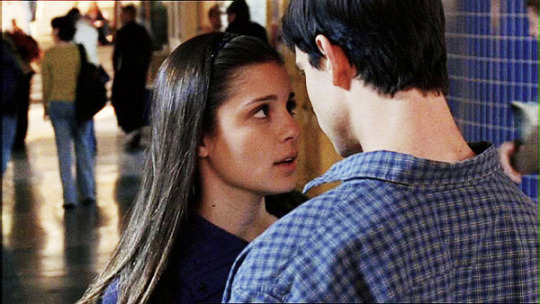

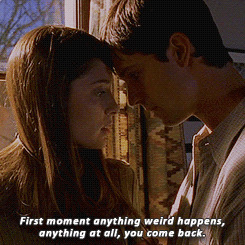
"Just don't fucking break her heart again." He was quiet at prom. I...
OK so I'm really on neither side here because I don't care but there is a bit of a difference between Conrad telling Jere to suck it up and let him be with Belly, which was insensitive, and Jeremiah about to make out with his brother's ex girlfriend in public.
"When things aren't perfect instead of trying to fix it, he decides to throw it away" but we literally never see him do that?? Like he leaves Brown to go to the house to stop the sale, he's like Liam or whoever, he got a judge to let him access the trust, let's do that. Jeremiah did you think of anything you could do to help save this house except bring flowers to Julia, which failed, or did you just go let's not give up every time reality hit? Because even the "let's get Syke on our side" plan was Belly's? Idk dude, you're talking a big game for a character who I've seen be effectively useless??
"When shit got tough, he couldn't handle it and he dropped you", he literally said he couldn't go to back to the prom and Belly was like LET'S BREAK UP THEN and then he tried to be like wait that's not what I mean and Belly refused to listen?
I ... WHAT?
See, this isn't a blowup. This is a very contained, very quiet fight and this is when it's supposed to be a dirty OH SHIT fight. We should get a version of this, GET IN HIS FACE JERE
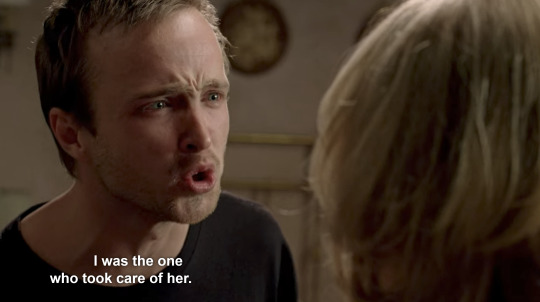
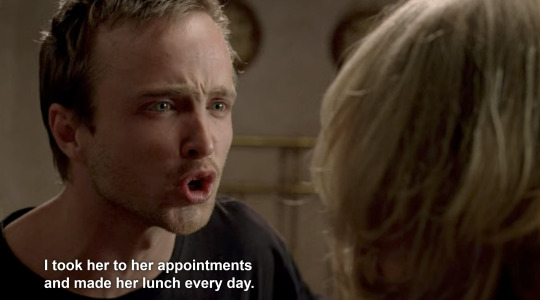
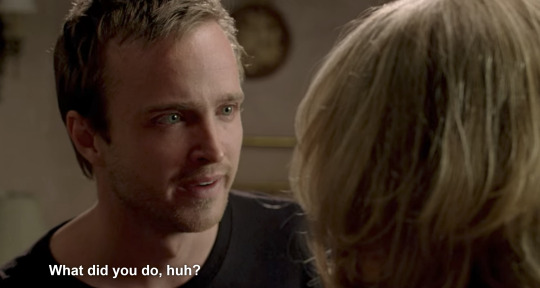

rail up on him


be specific
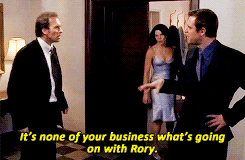

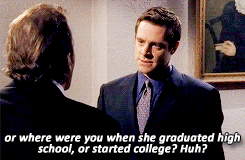
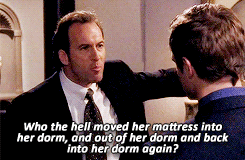
don't be afraid to have a fight! Not to mention I can't believe this fight because like 98% of the things he's accusing Conrad of, I don't think Conrad actually did, that would make him too much an active character. He is literally just a guy who's been sad.
And I know they hinted that Jeremiah has to deal with stuff because he was putting together Susannah's receipts or whatever but this is when juxtaposition would work where we see him see her wither away, we see him give her ice chips, we see him take care of her and Conrad is with Belly or at school.
Belly, why are YOU drunk? omg, at least Marissa's drama was FUN.
"I'm not leaving you, Belly." "But you already did!" I mean DID HE? And he also explained WHAT happened with Aubrey?
Someone said Conrad is like a ticking time bomb but what happens when he explodes because I haven't seen it. I've just seen him be sad.
And ALSO THIS SHOULD HAVE THIS KIND OF ENERGY






Belly, you are actually a ridiculous person

If they really wanted me to believe that Conrad was slipping away little by little throughout their relationship then they can't just leave that up to prom and a voiceover. I needed to see him actively shut her out, I needed to see her actively try to talk to him and him refusing to let her in. I needed to see him be Jess. Otherwise, this is RIDICULOUS.
Oh good, you know what I needed now? Another Taylor Swift song.
And then Belly turns around and kisses/chooses Jeremiah after this? BRO. WHY DO EITHER OF YOU LIKE HER?
7 notes
·
View notes
Text
Imagineif
‘Recognized. Batman. 02.’
‘Recognized. Robin. B-01
Bruce stepped through the zeta-tube, fear burning in his veins for the first time in a long time. Robin followed closely behind giddy as a kid on Christmas morning.
“I can’t believe I agreed to this,” Bruce glared at the numerous monitors in the entryway, each tuned in to a different viewpoint on Earth. He scanned the screens for any emergencies and growled when he saw nothing amiss. All things considered, he would rather be fighting an alien invasion. He grasped tightly to the bag of scones Alfred was kind enough to prepare.
It wasn’t too late to turn back now. No one had seen them yet. He could tell Superman the Joker escaped Arkham again. But Clark would be able to see right through his phony lie.
“Wow!” Dick ran towards one of the windows, his bright-yellow cape flapping behind him. Bruce grumbled a noncommittal response. “Super cool!” Dick beamed, eyes wide in wonder as he basked in the ethereal light of outer space. “I can get used to this view.”
“Nice of you to join us, Batman,” Superman appeared in the archway, crossing his arms over his larger-than-life chest.
Everything about Superman’s demeanor was guarded and careful. He crossed his arms in an attempt to make himself seem smaller and casual. He avoided meeting Batman’s gaze head-on, fearing he’d take it as a threat. Clark wasn’t under any delusions that Batman and Superman would ever be friends. He kept his voice neutral, void of any emotion.
“I swear you won’t regret it, sir,” Superman said, offering Batman a timid smile.
“Hrrmm,” Batman grunted. He already did regret it.
Bruce stiffened and not for the first time felt a stab of guilt in the presence of Superman. It was odd being addressed by Clark in such a formal, detached, way. Bruce Wayne knew Clark Kent. He loved game night more than Christmas. Last night Clark couldn’t shut up about Batman finally joining the Leaguers for game night. He was hoping they could move past their differences and be friends. He didn’t realize they were already friends.
Bruce should have told Clark, right there and then, but it never seemed like the right time. It was easier to allow Clark to believe Bruce and Batman were two separate people. If Bruce Wayne were here, Superman would have already invaded his personal space and hugged him, even though he wasn’t a huggable person. If Bruce were here Clark would have made a joke about Bruce’s lack of skills in the kitchen.
“Are those scones I smell?” Superman’s eyes widened, his voice growing an alcove higher. For a second he allowed Clark Kent to leak through the crevices.
Bruce should have known he couldn’t hide Alfred’s cooking for long. Not when he was in the presence of an alien that could smell brownies baking in North Dakota all the way from outer space. Wordlessly Batman proffered up the bag of scones from under his black cape.
“I didn’t know Batman could cook!” Superman said excitedly, taking the bag of scones from him. “I mean of course you can cook . . .” he bit through a chunk of strawberry scone, the sticky red jam dripping down his chin. “You’re Bate-man - can do anything!” Clark said through a mouthful of scone.
Bruce involuntarily winced. He didn’t know how long he could keep up this facade. It took all his willpower not to comment on Kansas’ poor eating habits.
“Funny,” Superman swallowed, licking his fingers. “My friend’s butler makes scones just like . . .”
“Oh my Rao,” Robin gaped up at Superman, grinning ear to ear. “You’re Superman!”
Superman sputtered in shock, spitting out bits and pieces of scone all over his suit, gaping at the kid at his side. He hurriedly set the half-eaten scone back in the bag and straightened up. Clark rubbed fruitlessly at the sticky jam on his chest to no avail. A real smile tickled Bruce’s features. He knew he made the right call bringing Robin along.
“That is what the papers call me,” Superman smiled in amusement. “But my friends call me Kal.”
“Can I be your friend?” Dick asked hopefully. “We can fight crime together and play dodgeball in space!”
When Bruce decided for Robin to tag along, he neglected to take into consideration the fact that Dick Grayson is the head of Superman’s fan club.
“I’d rather avoid crime fighting if I can,” Superman said evenly, but Bruce knew him well enough to pick up the judgmental lilt in his tone. “Say, Robin do you like air hockey?”
“Love air hockey!” Dick grinned.
“Wonder Woman would love a partner,” Superman said.
“No way! She’s here too!” And Dick was off, eagerly hunting down the other League members. Bruce scowled. Traitor.
“Nice kid,” Superman turned towards Batman. “How old is he?”
“He just turned ten.”
“Younger than I thought,” Superman said. “He’s a little boy!” Here we go again, Bruce ground his teeth together. It was a never-ending battle with Superman. “He should be enjoying his youth, not chasing after Supervillains every night!” Clark said passionately.
“That little boy has been through more trauma than you possibly could imagine,” Batman hissed. “Fighting crime helps him cope.”
“He is not you!”
“Robin is not your concern,” Batman said brusquely, not leaving room in his tone for arguing. But he knew Clark wouldn’t let this go easily. Bruce had been at the receiving end of Clark’s rants about Batman. Batman taking a kid on patrol was the tip of the iceberg.
“Adding more trauma isn’t the answer,” Superman explained. “I know what it’s like to lose someone you care about he doesn’t need to punch . . .”
“Bullshit!” Batman hissed. “You have two loving, very much alive parents who at this moment are probably up worrying about their naive son. You know nothing about true loss!”
“How do you know that?” Superman’s eyes turned crimson. The heat scorched Batman’s face and he took an involuntary step back, his breath hitching. He had seen Superman burn through state of the arts androids and level up entire buildings, but not once was that fiery gaze aimed toward him.
Bruce squared his shoulders and matched Superman’s glare. “I’m Batman.”
“Hera, help us,” Diana strolled into the entryway her features drawn taut. She had traded out her Greek armor for sensible jeans and a biker’s leather jacket with a spattering of stars on the front pocket.
“I can’t leave you two alone for a second without risking Armageddon,” her arms flew to her hips, looking every inch like a mother scolding her boys. “Kal-El,” she said, a hidden warning in her tone. “That is no way to greet a teammate.” Dutifully Superman’s eyes dimmed back to cerulean blue, but his expression remained turbulent. “Batman apologize for being a dickhead.” Clark smirked triumphantly.
Bruce was not going to dignify that with a response. “Let’s get this game night over with,” He shoved past Superman and Wonder Woman and into the game room.
Batman was immediately overwhelmed by the lack of monitors displayed. Superman insisted the game room would be a place of relaxation, not a ‘war room.’ A grave mistake. Lex Luthor or Bane could be heading their way and they won’t be the wiser. Fortunately, the game room was located on the main deck so if anything did go sideways - as it always did- Leaguers had easy access to zeta tubes in the next room.
An island wrapped around a decent-sized kitchen; it would make Mama K green with envy. Superman had stocked the fridge with all-you-can-eat junk food. Batman knew because Bruce had loaned Clark his membership card for WayneMart.
Beyond the kitchen was a den; a sofa comfortable enough to sleep in faced a platinum-sized screen. At the moment a rerun of Star Trek was playing on the tv. A red and black checkered blanket hung over the edge of the couch, covering a duffle bag on the floor. Bruce saw the edge of a notebook poking out of the bag. Bruce felt a pang of guilt. Clark had been living here ever since the bomb destroyed his apartment. It was no wonder he was so keen on game night. He must be going stir-crazy alone in Watchtower. Clark had asked to come to stay at the mansion, but Bruce had chickened out. Clark was such a Nosy Nancy, one look in the basement and his secret will be out.
Some of the league members were already sitting around the kitchen table. Unsurprisingly Flash sat closest to the food, scarfing down chips and salsa. Dinah sat next to Oliver, playing a game of footsie with him under the table. When Batman walked in the noise died. All pairs of eyes zeroed in on him. Flash froze mouth indelicately full of chips.
Bruce felt like he was five years old again, his parents abandoning him at school. Father had held him in his arms and explained, “You would be a lucky man if you can count your friends on one hand.”
Bruce’s throat closed up at the memory and shuddered to think things hadn’t changed that much. His only friends were Alfred and a naive alien. He supposed Dick was his friend too, but he viewed him more as the son he never dreamed he could have.
“Hi everybody!” Dick rocked back and forth on the ball of his feet. “I’m Robin!” he waved enthusiastically to the group. “We come in peace. I promise Mr. Gloom and Doom isn’t here to ruin your fun.” he flicked a thumb back at Batman. Batman narrowed his eyes at his young charge.
“We were just about to start imagineIf,” Barry explained. “Clah . . . Kal loves this game.”
His midstep didn’t go unnoticed by Bruce, but he chose to not say anything and sat in the empty seat next to Superman. Robin took the chair opposite him. Clark set up the board game, jotting down everybody’s names and explaining how the game worked. It seemed easy enough. Though the only problem was, Superman was the only Leaguer present he bothered to get to know. He supposed this was the point of game night, to ‘bond’ with his teammates.
“Youngest present goes first!” Robin declared, snatching the dice right from under Superman’s outstretched hand. Bruce suppressed a chuckle at Clark’s annoyed face. Superman leans back in the chair, refraining from arguing. Robin rolled the dice which landed on 6 and moved the gray game piece. Just his luck it landed on Batman.
Robin drew a blue card. “Imagine if Batman were a piece of advice, which would he be?” He giggled. “One. Trust no one. Two. Be honest at all times. Three. Treat others the way you want to be treated. Four. Believe in yourself. Five. Failure is not an option,” Robin laughed at that. “And six. Dress for success.”
“This one is too easy!” Diana slammed down her card facedown.
Bruce knew exactly which one he would choose. His greatest fear was failing. He couldn’t live with himself if Gotham’s Underworld created another orphan on his watch. He put his card down. The rest of the gang followed suit. Slowly everybody revealed their votes. Clark and Bruce were the only ones to put down #5. Everybody else put down #1.
“Seriously?” Batman caught each of his teammate’s eyes. “That’s how little you think of me?” He crossed his arms over his chest. “The alien knows me better than you lot.”
“Well, to be fair,” Barry piped up. “You’re not exactly the trusting type.”
“I trust plenty of people,” Batman’s ears grew red.
“Name two,” Dinnah challenged. “And Robin doesn’t count, he’s your ward.”
“Superman and Commissioner Gordon,” Bruce responded without preamble. He also trusted Alfred with his life, but they didn’t need to know that. Not many heroes had a butler at their disposal. Well, Clark had Connie, but she was a robot.
Two pink dots appeared on Superman’s cheeks. “Wha-uh really?”
“Don’t let it go to your head,” Batman hissed. “And shut your mouth. You look like a codfish.”
“Gods forbid, you allow yourself to have a heart,” Diana quips.
The majority of voters moved their pieces on the board. This game was stupid. Clark and he were still stuck at the beginning. It would make more sense for them to match their card with the subject’s answer. Superman was after Robin. He rolled the dice, and go figure he landed on the Flash.
Clark let out a bark of laughter the instant he saw the card, his eyes tearing up. “Imagine if the Flash were a villain which would he be?”
“I fail to see what’s so funny about that.” Bruce cut out. Clark held up one finger to silence him.
“One. Darth Vader. Two. Gollum. Three. Hannibal Lecter. Four. Lord Voldemort. Five. Cersei Lannister. Six. Reverse-Flash.”
“What?” Flash screamed aghast. “No way!” he grabbed the card from Clark to examine it closer.
Superman snickered. “Somebody f***** up the timeline again.” It was the only explanation for Reverse Flash’s name being mixed in with that bunch.
The rest of the team followed suit with various bouts of snickers and giggles. Bruce stared petrified at the Boy Scout. He had never heard Clark utter more than a whispered, ‘damn it.’ Curse words sounded wholly unnatural and demonic coming from his lips. It made him want to go back to the cave and retrieve the jewelry.
“That sick maniac,” Flash shook his head. “Even has to rule over Game Night.”
“I think it’s hilarious.” Clark chucked. If Bruce didn’t know any better he would have thought Superman was drunk or on Joker venom. “Your villains crack me up. They’re funnier than the Joker.”
It was a direct dig at him, but he wouldn’t rise to the bait. The vote was unanimous. Everybody put down Reverse Flash to Flash’s horror. He put down Gollum in spite.
It was finally Batman’s turn. He groaned when he landed on Superman. At least this was someone he knew relatively well, but so did everybody else at the table. He hated losing at anything. This was his chance to up his game. He released a sigh of relief when he saw the card.
“Imagine if Superman was attacked by an armed mugger. What would he do?” He couldn’t help smiling a smidge. This would be too easy. “One. Scream and hope someone comes to his rescue.”
“Lois will definitely save you,” Barry said in a singsong voice. He puckered his lips and blew a red-faced Clark a kiss.
“And if she fails there’s always Maxima.”
“Grow up,” Dinah kicked Oliver under the table. “Go on Bats.”
“Two. Call the police and take down the mugger’s license plate (if available.)” Bruce shook his head. No mugger would be stupid enough to have their car parked nearby. “Three. Fight off the mugger with impressive Jujutsu moves.” Not exactly Clark’s style.
“Sounds more like you Batsy,” Barry leaned forward. “I’ve been meaning to ask . . . would you teach me some moves.”
“Trust me, you don’t want him as a trainer,” Robin answers for him. “He’s brutal.”
“I can only imagine,” Dinnah rolled her eyes. “Ollie is just as bad.”
“Am not!” he protests.
Bruce gritted his teeth. “Do you mind?” he snapped. “I’m trying to read here.”
“Take a chill pill B-Man,” Flash holds up his hands defensively. “It’s just a game. Part of game night is bonding with friends.”
“You’re not my friends.” He growled. “You are colleagues.”
“I don’t see why we can’t be both.” Superman folds his hands together over the table, ever the diplomat. He could teach Wonder Woman a thing or two about diplomacy. “Your ‘colleagues’ as you so eloquently refer to us, will be more likely to have your back should things go south if you took the time to build a connection with them.”
Human connection was his kryptonite. Batman and people did not mix. Besides, why would he need any of these Bozos when he had an alien in his back pocket? Or at least Bruce Wayne did.
“Nice speech alien,” Bruce’s tone was unforgiving. He knew how much Clark hated to be called an alien, but it was all part of the facade of Batman. Clark preferred the term ‘Traveler.’ “Did you read that on a Hallmark card?”
“Yeah, a Hallmark card shoved up your ass.”
“That’s enough boys!” Diana slammed her fist on the table. “If you two do not learn to be civil towards each other by the end of the night, I will personally send you both to the Phantom Zone and you will have no choice but to put your differences aside and work together.”
A plan was already forming in his mind. “We will just need an ounce of Kal El’s blood. Should be easy enough to procure in the Phantom Zone.”
Clark opened his mouth to retort. “You low life, spoiled, sanctimonious. . . I would never let you, ” Diana silenced Clark with a quelling look.
“Kal-El,” she warned. “Remember your upbringing. You know better than him. Do not rise to the bait.”
“Yes, mother.” Clark was such a pushover. Was he going to let her belittle him like that? Diana was not his mother.
“Now. Continue the game,” Diana commands brusquely. “Prospiatheiseh na mein eisai malakas.” she chided in fluent Greek. Bruce’s ears turned pink at the vulgarity.
“She just called you an asshole,” Clark translated for me.
“You’re not the only one that knows three hundred languages.”
“Really?” Superman’s eyes glimmer deviously at this newfound knowledge. “To neo sas kodiko onoma einai malakas.”
“Kai si eheis to myalo enas morou,” Batman responded in turn.
“Kalytera na eimai morou para paidofilos.”
“Afiste to paidi mou!” Bruce growled.
Diana shook her head bracing her hand against her palm. “Hera help me.” she looked up heavenward. “I’ve opened up the gates of Hell.”
“I want to play the game they’re playing,” Barry said.
“I don’t understand anything,” Robin said. “But I’m pretty sure they’re not saying anything good.”
#superman#superman fanfiction#justice league#justice league unlimited#super friends#diana prince#bruce wayne#bruce wayne is bad at feelings#alfred pennyworth#alfred's cooking#The Flash#Barry Allen#oliver queen#green arrow#fanfiction#a03 fanfic#fanfic writing#dc fanfic#DC comics
10 notes
·
View notes
Text
Artificial intelligence voice scams on the rise, Better Business Bureau warns
Scammers are incorporating artificial intelligence into old schemes, putting a technological twist on so-called "grandparent scams."
“With new technology coming up, there are many scammers who are changing their tactics and using A.I. as a way to further legitimize themselves to convince people to hand over money,” said Kristin Matthews of the Better Business Bureau’s division in Atlantic Canada.
Matthews said one emerging example was the use of A.I. to clone the voices of friends and family members in phony situations.
“[Scammers] are essentially taking these clips of people’s voices on social media,” said Matthews. “They’re using A.I. to manipulate these voices to make it seem like this person is calling you.”
The scammer then mimics the person’s voice using A.I. technology to make desperate pleas or aggressive demands for money.
Earlier this month, a mother in Arizona said she received a phone call and heard what she initially believed to be her daughter crying, followed by threatening ransom demands. The child wasn’t involved.
“These are known as emergency scams and prey on people’s willingness to send money to a friend or relative in need,” said Matthews, adding caller ID from these scam calls can sometimes appear as the impersonated contact, making it appear even more legitimate.
“We’ve gotten at least two [reports] a week for the last few weeks,” said Matthews. “We’re anticipating for this to become a larger scam. We would like for people to keep an eye out and know what the red flags are if they get this type of call.”
People should always be skeptical of any pressure from an individual or company to send money quickly and under urgent conditions.
“Just resist the urge to act immediately because scammers really want to instill this fear in you and get you to pay up right away,” said Matthews. “Sometimes you really need to take a step back and think logically. Maybe you want to check out this story with other friends and family members.”
from CTV News - Atlantic https://ift.tt/Y4aD0Z2
2 notes
·
View notes
Text
How RideBuddy Ensures Safe and Reliable Carpooling for Everyone
Overview When it comes to ride-sharing, safety is the top priority. RideBuddy places a high priority on security because of this. Our platform is made to give all users a smooth and secure carpooling experience.

The Safety Features of RideBuddy 🔹 User Verification: To guarantee authenticity, each driver and rider goes through a rigorous verification process. 🔹 Real-Time GPS Tracking: For extra security, share your current location with loved ones. 🔹 Reviews & Ratings: Take a trip with commuters who have received great reviews and ratings. 🔹 SOS Emergency Button: When necessary, instantly notify emergency contacts or authorities. 🔹 In-App Chat & Call: Use the app to safely communicate with other riders.
How RideBuddy Guards Against Fraud and Untrustworthy Rides ✅ AI-Powered Fraud Detection: Spots suspicious activity and phony accounts. ✅ Background checks: Confirms personal information prior to user approval. ✅ Tight Ride Policies: Upholds neighborhood norms to ensure a secure ride.
Select RideBuddy and Travel with Confidence! Our top priority is keeping you safe. Enjoy a safe, dependable, and stress-free carpooling experience by signing up with RideBuddy now! Haha, 🚗
0 notes
Text
Oliver Willis at Daily Kos:
Donald Trump’s inner circle of advisers is reportedly searching for a disease to use as an excuse to invoke a public health emergency, allowing his incoming administration to implement strict anti-immigration rules. The New York Times reports that Trump’s team hopes to invoke a federal policy called Title 42, which governs public health restrictions on travels, as a way to effectively shut down the U.S.-Mexico border. Trump has spent most of his political career pointing to Mexico and migrants from south of the border as the cause of many of America’s problems. The effort is reportedly being led by senior Trump adviser Stephen Miller. Miller has a long history of racist connections, including promoting white supremacist literature and racist immigration stories while he was an aide to former Alabama Sen. Jeff Sessions.
In 2023, Miller told the Times that a future Trump administration would likely cite “severe strains of the flu, tuberculosis, scabies, other respiratory illnesses like R.S.V. and so on, or just a general issue of mass migration being a public health threat and conveying a variety of communicable diseases” so that Title 42 could be invoked. During the Nazi regime of Adolf Hitler, the German government accused Jewish people of spreading diseases. This was used to justify antisemitic policies, ultimately leading to the murder of millions in the Holocaust. The first Trump administration invoked Title 42 after the emergence of the COVID-19 virus. After this occurred, thousands of unaccompanied children were expelled at border crossings, sending many of them back into the dangerous conditions they were trying to escape.
Despite this, Title 42 didn’t deter people from coming to the U.S. When the policy was in full force under Trump, border patrol records show that apprehensions increased after it’d been invoked.
The Trump Misadministration are seeking to push for the closure of the US/Mexico Border on flimsy grounds of a “disease” outbreak to enact a phony public health emergency as part of their anti-immigrant crusade.
See Also:
The New Republic: Trump’s Plan to Shut Down Mexico Border Is His Most Dangerous Yet
#Donald Trump#Stephen Miller#US/Mexico Border#Diseases#Border Crisis#Trump Administration II#Immigration#Title 42#Coronavirus#Public Health Emergency
1 note
·
View note
Text
Difference and Repetition: The Filmmaking of Marguerite Duras
Though best known as a novelist, Marguerite Duras pursued a unique filmmaking career of upending expectations.
Lawrence Garcia 08 SEP 2020
MUBI's series Hypnotic Incantations: A Marguerite Duras Focus is showing September - October, 2020 in the United Kingdom and United States.

In 1955, Jacques Rivette famously wrote that Roberto Rossellini’s Voyage to Italy“opens a breach… that all cinema, on pain of death, must pass through.” For Rivette and many others, the film heralded nothing less than the arrival of a modern cinema—and not five years later, Alain Resnais, with a screenplay from Marguerite Duras, took up this challenge with Hiroshima mon amour (1959). Following the film’s seismic premiere, Eric Rohmer declared it either “the most important film since the war” or “the first modern film of sound cinema,” its overture of tangled, ash-covered limbs even echoing the embalmed couple Ingrid Bergman turns away from in Voyage to Italy’s memorable Pompeii-set passage. With her seminal script, Duras could thus claim to have widened the gap opened by Rossellini, readying the space through which her own cinematic practice would later glide. But in the end, perhaps the challenge of Voyage to Italy was, at least for her, no more than the challenge of writing itself. In her memoir-cum-essay “Écrire,” composed three years before her death in 1996, she speaks movingly of the solitude of writing, its silent scream, but also its singular inducements: “Writing was the only thing that populated my life and made it magic. I did it. Writing never left me.”
And indeed it didn’t—neither through the numerous books published during her lifetime, nor through the roughly 20 films she made from the late ’60s to the early ’80s. That Duras’s directorial reputation still lags behind her literary fame is undeniable, and the sight-gag in John Waters’s 1981 Polyester, of an American drive-in showing “Three Marguerite Duras Hits,” plays about just as well today. But rather than the proliferation of Durases that have emerged in sundry biographical/critical treatments of the artist—she is by turns “unintelligible,” “narcissistic,” “difficult,” and “obscure”—her cinema has gained the stature of an unapproachable edifice, forbidding and remote. An unfortunate state of affairs for an artist so gripped by, as she herself put it, the perpetual desire “to tear what has gone before to pieces.” Destroy, She Said, her fourteenth novel and second feature, both released in 1969, emerged for her from “the idea of a book… that could be either read or acted or filmed or... simply thrown away.” The conceptual pivot of both versions, set in a rural hotel that’s something more like a sanitarium, is a phony card game used as a vehicle for interrogation and entrapment of one of the players; as always with Duras, the rules of the game are never quite clear at the outset. But echoing the final scene of Blow-Up (1966), it is the periodic sounds of a tennis match—heard but not seen, and commented on throughout the novel/film—which lay the groundwork for the plays with image and sound that recur through the films of hers that followed.
“I don’t think the image can ever replace what I called ‘the indefinite proliferation’ of the word,” she declared to Jean-Luc Godard in one of their three conversations on the twined subjects of son et image (spanning 1979–1987 and subsequently collected into the volume Duras / Godard Dialogues). But just as the New Wave icon’s work would continue to grapple with such questions—his disorienting, staccato bursts of image/sound would intensify in the ’80s, beginning with Every Man For Himself, in which Duras can be heard but not seen—Duras’s own oeuvre, through rather different means, sought to challenge preconceptions and overturn cinematic orthodoxies. Destroy, she said—and so she did, continually questioning received filmmaking methods, and through a kind of discovery by dissolution, conceiving of how things might be otherwise. Likewise, her most famous novel, the Prix Goncourt–winning The Lover (1984), speaks to the “indefinite proliferation of the word” mainly in terms of difference, its autobiographical scenario having been treated previously in The Sea Wall (1950) and later in L’amant de la Chine du nord(1991). Fittingly perhaps, The Lover (whose sundry editions place the photo of a young Duras on their covers), offers up a particularly intriguing coinage not in its finished form, but in the working title of one of its manuscripts: “La photo absolue” (or the absolute photograph). The discarded phrase gives name to a notion—possibly illusory—from which Duras’s practice, with its penchant for repetition and revision, charts its own course of difference.

Above: Baxter, Vera Baxter (1977)
The nautical metaphor is not incidental, for the allure of the sea recurs time and time again across her cinema. It is there amid the Marxist musings of Le camion(1977) and the death-obsessed dolor of L’homme atlantique (1981), though between the two it crests in Baxter, Vera Baxter (1977), where a tale of sexual jealousy and dependence becomes as if subsumed into the Atlantic, its glimmering immensity glimpsed in a series of liberating cuts away from the film’s glass-enclosed, terrarium-like interiors. Like many a seafaring raconteur, Duras favors the directness of speech—implicitly or explicitly, her films often take the form of a dialogue. The great difference is her willingness to futz with the usual hierarchies of image and sound: To step into her films, with their perpetual enfolding of narrative necessity, visual-aural abstraction, and sensorial impact, is to be set adrift in conflicting currents of obsessive prose and measured movement. An experience not entirely unlike attempting to converse with the ocean.
It is easy to lose oneself in the resultant flux. So alongside Godardian strategies of sensorial bombardment, we might well speak of Durassian drift. Her gliding camera in the first half-hour of Le Navire Night (1979), a film comprised largely of exchanges between Duras and then-apprentice Benoît Jacquot, is enough to demolish any lingering preconceptions of her directorial austerity. The film’s challenge is not so much an arid aesthetic of alienation, but a bewildering multiplicity of sensuous attractions and compulsive mysteries, here centered on the ambiguous relationship between a dying young girl and a man she knows only through a series of intimate phone calls. By the end, one has to sort through a set of nullities: between the absences and gaps of ultimately no consequence at all, and the voids around which one might center an entire existence.
So it goes too with the spectral spaces of her most celebrated feature, India Song(1975), starring Delphine Seyrig as the wife of the French ambassador in a Calcutta of the colonial imagination (shot in the Château Rothschild in Versailles). The film’s narrative framework had been laid in her previous novels The Ravishing of Lol Stein(1964) and The Vice-Consul (1966), though from the cinema, there is also Orson Welles’s The Immortal Story (1968), with its particular, perverse interplay of material decadence, sexual domination, and stories told under the sway of the sea. For India Song’s entirely asynchronous soundtrack, though, filled in mainly by the composer Carlos d’Alessio (one of Duras’s closest collaborators), one has to look forward to something like Wong Kar-wai’s In the Mood for Love (2000), which likewise draws the viewer into a dispersed atmosphere of lush sorrow, and pushes its story scaffolding to extremes of aural detachment and spatial alienation. It is between these poles, in the dead heart of India Song, that one finds an earlier instance of la photo absolue: a framed portrait sitting atop a grand piano, and the point about which the film’s currents of desire eddy and swirl. Behind it, a mirror spanning the height of the wall. At the far end, an unused fireplace; to its right, a staircase. At the zenith, a crystal chandelier. At the nadir, a supine body—languid, lusty, and lacquered in sweat.

Above: India Song (1975)
Before it was a film, India Song existed as a play (commissioned by the National Theater in London in 1972, albeit never staged), an act of artistic doubling that was, for Duras, far from exceptional. (Le Navire Night opened on the stage the same week the film version was released in cinemas, while Baxter, Vera Baxter preceded the publication of Vera Baxter ou les Plages de l’Atlantique.) But whereas this cross-media tendency might, for some, have signaled some implosive synthesis of various art forms, what it revealed in Duras’s hands was the sticky stubbornness of medium specificity. If anything, these myriad excursions from page to screen to stage only made her more acutely aware of the indissoluble boundaries between each. There’s no precise analogue in cinema for the declarations of “silence” that recur like timed explosions throughout Duras’s writing, and there’s likewise no corollary in literature for the ceaseless celebratory thrum of the music that echoes throughout the near-entirety of Baxter, Vera Baxter, bringing to mind images of a pre-colonial paradise lost. Seyrig’s character calls the music an “exterior turbulence,” and apparently wary of the avowed certainties of her age, Duras seemed intent on seeking out or indeed creating such disturbances—in cinema and literature both.
Given her prolificity and predilection for creative destruction, any attempt to encapsulate Duras’s cinematic sensibility can seem counterproductive. But at the risk of bringing in an even more ill-defined concept, it should be said that her practice shares something with the essay film. There are certainly worse ways to describe Duras’s work than with Jean-Pierre Gorin’s definition of the film-essay as “the meandering of an intelligence that tries to multiply the entries and the exits into the material it has elected (or has been elected by). It is surplus, drifts, ruptures, ellipses, and double-backs.” Not the most conventional of artists, Duras often dispensed with explicit argumentative frameworks, even in her written essays. But if her works nonetheless manage to persuade or convince, to challenge or affirm, it is through the coiled force of their assertions, their apparent disregard for established pieties, and their perpetual drive to decenter and upend expectations. Unafraid to scavenge and repurpose, to reimagine and reinvent, she cycled through familiar memories and anecdotes and twice-treated tales, unabashed about producing works that might be considered adjunct, subsidiary, or otherwise incomplete. Which is to say that she did in the open what most artists do in secret. You could dismiss the results as mere exercises in style—but as in the case of fellow French literary giant Raymond Queneau, whom Duras famously interviewed in 1959, and with whom she shared a taste for judicious repetition, to do so would be to miss the distinctive, enduring appeal of her art.
By the 1980s, her work in cinema was all but behind her—perhaps due to a general disillusion with the form (the Durassian paradox, per Jacquot: “She detested cinema but adored making films”), though more likely, her deteriorating health and alcoholism made the physical demands of the camera impossible. At the nadir, a supine body, hospitalized in 1982 for disintoxication treatment. At the zenith, the Prix Goncourt and renewed international acclaim.
Towards the close of Le Navire Night, after the narrative proper (insofar as one exists) has concluded, Duras and Jacquot continue to converse on—what else?—the sea, and then on an uncompleted film, its creation stopped by death or by doubt. Certainly, Duras doubted many things before her death: the cinema, the fixity of the completed work, perhaps even the very notion of completion. But for a time, at least, the act of filmmaking remained—over nearly two decades, she picked up the camera again and again and again, finding worlds of difference with each repetition. For the cinema that she so doubted, that repetition made all the difference.

Above: Le Navire Night (1979)
1 note
·
View note
Text
5 Roadside Assistance Scams You Shouldn't Get Trapped In

Roadside assistance has become an inevitable service to rely on when you are stranded in a remote location during a long distance travel due to car breakdown or accident. Taking advantage of your helpless situation there are many towing companies that play a scam game to cheat you. Here are five common roadside assistance scams to watch out for:
Fake Towing Companies: With numerous car towing companies in the UAE, there are also many scammers who intentionally cheat with hidden service costs.Scammers may set up fake towing companies or pose as real service providers online. They often offer unrealistically low prices to attract customers, but once they've towed the car, they inflate the bill with hidden fees. Always research towing companies thoroughly, check reviews and credentials, and ask for upfront pricing quotes before agreeing to any services.
Unauthorized Repairs: When a car recovery technician suggests a bunch of repair, understand the problem in your vehicle and analyze if it is really required. Hoax roadside assistance providers may claim that your car requires immediate repairs or replacements, even if it doesn't. They may exaggerate the severity of the issue or perform unnecessary work to overcharge you. Be cautious if a provider insists on performing repairs without your consent or pressures you to make quick decisions. Always get a second opinion if you're unsure about the repairs recommended by a technician.
Bait-and-Switch Tactics: Never get away with attractive deals or discounts used by fraudulent towing companies to attract customers. Scammers may advertise attractive deals for roadside assistance services, but once they arrive, they claim that the advertised service doesn't cover your specific situation. They then pressure you into paying for expensive upgrades or additional services. Always read the terms and conditions of any roadside assistance plan carefully and clarify what services are included before signing up.
Phony Mechanics: There are many mechanics who have no idea about the actual repair service required by the car during an emergency. They cover up the situation by pointing out some unnecessary service requirements for the car. Some scammers pose as mechanics offering roadside repairs but lack the skills or qualifications to perform the work properly. They may cause further damage to your car or fix substandard parts, leaving you with costly repairs down the lane.Choose reputable roadside assistance providers with certified technicians to ensure your car is in good hands.
Staged Accidents: When you drive long distances, you may suddenly meet with an unexpected and suspicious accident. Be cautious in such situations.In more worst scams, criminals may intentionally cause accidents or create hazards on the road to coax unsuspecting drivers into their trap. They then offer assistance or claim by representing a towing company, only to steal valuables from the car or demand excessive fees for their services. If you encounter an accident scene or roadside hazard, act with caution and call a trusted roadside assistance provider for help.
Your Trusted Car Towing Service Provider At All Times- Royal Swiss Auto Recovery
By staying vigilant and exercising caution, you can avoid falling victim to these common roadside assistance scams and ensure a safe and hassle-free experience during emergencies on the road. We highly recommend you to reach out to reliable car towing service providers in Dubai, Abu Dhabi and Sharjah in case of an emergency. For more details reach us at +971 503 967 879.
0 notes
Text
By J.B. Shurk
Pop quiz, hotshot: You just stole the Democrats’ presidential nomination from a dementia-addled nursing home patient without receiving a single vote from the electorate and while having the lowest approval rating of any modern veep. Despite the nonstop efforts of corporate news propagandists to anoint you as a deserving heir, Americans rightly see you as a fake, foolish, insecure, insignificant, boozy, Canadian flop who has no business being behind the wheel of an automobile, let alone taking charge of a nuclear arsenal as commander-in-chief.
Do you (a) double down on crazy and find a string of sex-talking shock jocks to interview you about important public policies; (b) flood the country with illegal aliens so that Jim Clyburn’s fraudulent mail-in-ballot operations can overwhelm legitimate voters in battleground states; (c) wait for the FBI, CIA, and NSA to do what they do best by rigging the election in your favor; or (d) hope that Hillary Clinton, Joe Scarborough, Liz Cheney, and other Democrat mouthpieces can slander Donald Trump as a “dangerous Nazi” enough times to incite another attempt on his life? What do you do?
It’s a trick question. You do all of the above, of course. Then you make yourself a white wine spritzer, sit back, and call a bunch of national weather shows to give them your unsolicited drunken advice about surviving hurricanes. Everybody knows that when hundred-mile-an-hour winds are crashing against a terrified family’s home, nothing provides more comfort than listening to an inebriated chuckler blame “climate change deniers” for the catastrophic weather while taking credit for the heroic actions of emergency search and rescue personnel. Kamala Harris is just the phone-in phony Americans need for serious times — not!
0 notes